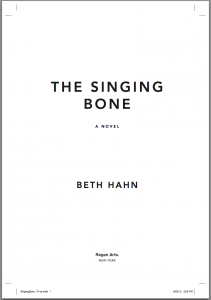A Title Change
P.S.: And back again!
When Regan Arts decided to change the title of my book from THE SINGING BONE to DARK EYES, it took me by surprise–but not completely. I was more surprised that I’d been able to hold on to my title for as long as I had. Book titles, if you didn’t know, are almost always changed by the publisher.
I got to keep THE SINGING BONE through editing and even saw the manuscript’s final version with title intact, but then, at some point–I think it happened during tip sheet review–there was a pause, and someone questioned my title, wondering if it were too literary, too mysterious, too–oh, but those were the very things I liked about it. Anyway, the publisher worried that readers wouldn’t know the how to interpret THE SINGING BONE, and truthfully, I had noticed this when I told people. “The Singing what?” was not an uncommon response.
I guess I could have fought for my title, but then, honestly, I sort-of knew why the title was being changed, so I began to think of the title change as a further relinquishing of my book. Yes, THE SINGING BONE was my novel’s title, but when a book is sold, it belongs to everyone–to editors and art directors and readers, too, to libraries, and to strangers who would not get to ask me, “The Singing what?”
For a few weeks we kicked titles around. Mine were all terrible. My editor wrote: “Think GIRL ON THE TRAIN.” Girl in the song? No. So bad. For a minute we all wanted something with birds, but the bird title proved intangible and fluttered away. I went through the whole book, pulling bits of text here and there–maybe this? Or that? But it never led to anything. My titles were getting more abstract and felt like bits of stilted haiku. I strung them together at night, sleepless. Did my book still exist if it didn’t have a title?
Finally, I got an email from my editor: “What about DARK EYES?” he wrote. It was clean, relevant. It screams “Mystery/Thriller.” I’d thought of DARK EYES, but I’d been too literal with it. The darkest character in the book, Mr. Wyck, has blue eyes–light blue eyes. But the song “Dark Eyes” cuts a strange path through the novel, turning up in different scenes and carrying plenty of psychological and emotional weight.
Then it occurred to me: Maybe DARK EYES really is the title. I began to let THE SINGING BONE slip away and looked for a new version of “Dark Eyes” to listen to while I got used to it. I found this version, by Earl Hines, which I really like. That violin feels like an introduction, doesn’t it? It tells the listener that this version will be fun, a bit spooky, and beautifully played.
I hear it and know I’m in for a treat.





